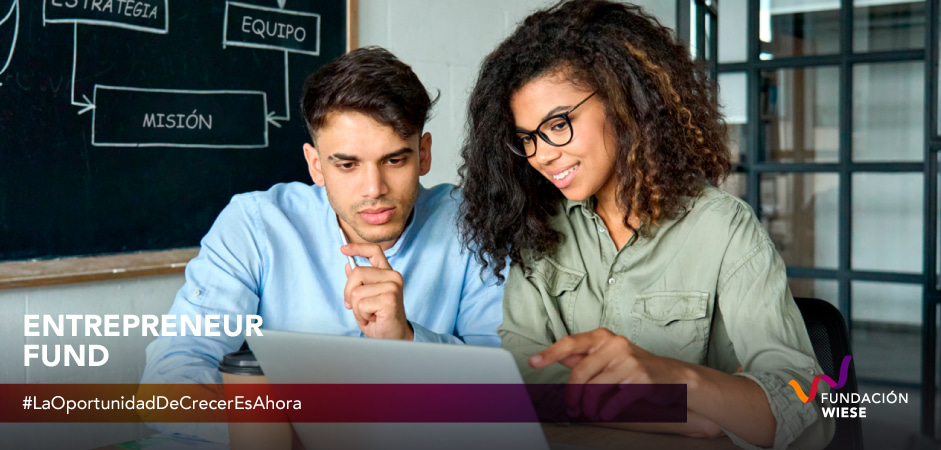- The Wiese Foundation, a non-profit organization, points out some financing alternatives for social enterprises in times of uncertainty.
- On this occasion, the Wiese Foundation calls for entries for the second edition of its “Entrepreneur Fund” program that will grant financing worth S/150 thousand, training and professional advice to Peruvian social impact ventures.

Access to financing represents the main barrier to starting a venture in Peru (58%), followed by the country’s economy (18%), the knowledge required (16%) and interest rates (7%), according to the recent study “Entrepreneurship in times of inflation” conducted by Ipsos. Despite this, 47% of the people surveyed indicate that they started a business in the last few years, motivated by the pandemic, and 52% indicate that they are likely to do so in the near future. Peru continues to be one of the countries with the greatest entrepreneurial and innovative spirit, according to the aforementioned study.
Moreover, INEI (National Statistics and Informatics Institute) estimated that by the second quarter of 2022 there would be just over 3 million companies in Peru and, according to estimates by ENAHO (National Household Survey), 96% would be MSMEs. “Within this entrepreneurship ecosystem are those who use market mechanisms not only to obtain profit, but also to generate sustainable and scalable social impact; that is, social enterprises”, says Ingrid Claudet, General Manager of the Wiese Foundation.
In the face of the barriers that these social enterprises confront to obtain financing aimed at stabilizing and scaling their businesses, the Wiese Foundation points out some alternatives available to these companies in times of uncertainty:
Angel investors. They are individuals who provide seed capital and mentoring to ventures. They also provide to them contacts and advice, usually in exchange for a percentage of participation in the business.
Incubators and accelerators. Their objective is to promote the creation and scaling of ventures in the early stages by providing them with workspaces, mentoring sessions and, in some cases, connecting them with investors, in exchange for a stake in the business and/or their future earnings. They also provide their acceleration services to third parties in exchange for an economic consideration.
Contests or prizes. Created by public or private entities. The prize consists in the delivery of non-reimbursable funds after a process of call for entries and evaluation of applications. Some require a counterpart from the enterprise, while others are more oriented to making the ventures visible and connecting entrepreneurs with the local entrepreneurship ecosystem.
Specialized banking. Banking entities that specialize in micro and small businesses or that have financial products (lines of credit) aimed at them. They usually require some type of guarantee and credit history, and they charge market interest rates.
Impact investment funds. Specialized private entities that raise patient capital and provide financing, usually at market rates, for social ventures that meet certain pre-established risk and impact criteria. The presence of these institutions in Peru is still incipient.
Social innovation programs. They are created and financed by corporations, foundations or other non-profit entities, within the framework of their CSR or their institutional purpose. They combine call for entries processes, comprehensive evaluation, financing and acceleration services that they execute directly and/or through third parties. The financing schemes that these programs offer to the beneficiary social ventures tend to have more flexible and advantageous conditions than those available in the financial market (formal and informal); and the training and professional accompaniment that they grant, together with the financing, are free of charge, against formal commitments of growth and impact.

Furthermore, these institutions connect ventures with other entities and related professionals, thus strengthening their professional networks of contacts. There are still very few social innovation programs in the country, but there is growing interest in the corporate and philanthropic world for this more sustainable way of providing aid.
Four years ago, the Wiese Foundation was the first Peruvian foundation to create a comprehensive social innovation program financed within the framework of its founding purpose. Currently, it is calling for entries for the second edition of the aforementioned program called “Entrepreneur Fund”, though which it will finance Peruvian social enterprises with S/150 thousand, also providing them with training and professional accompaniment for 18 months.
To qualify, interested ventures must (1) be private entities constituted in Peru, (2) declare annual sales of at least S/25 thousand, (3) be oriented to their self-sustainability through a commercial activity (sales) and, above all, (4) demonstrate that they are capable of contributing to solving a social or environmental problem that affects a vulnerable community through its commercial success.
This edition of the Entrepreneur Fund has the participation and support of UNESCO, UTEC Ventures and W Capital, and it will reward social enterprises that can accredit some type of link with the revalorization and preservation of our material and immaterial cultural heritage. More information on how to apply, the requirements and benefits at www.fondoemprendedor.org









